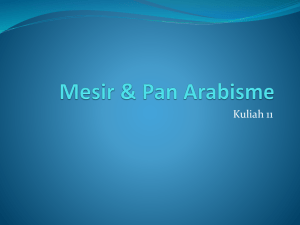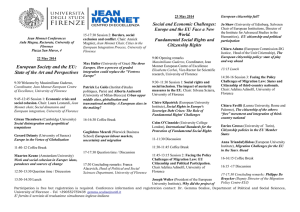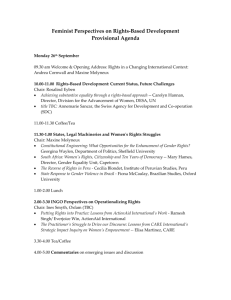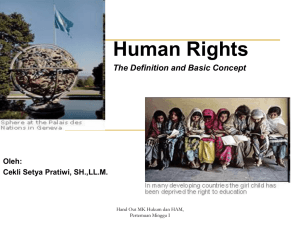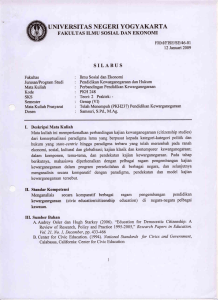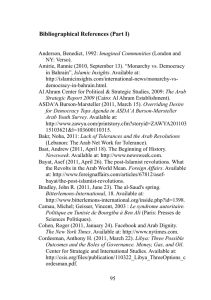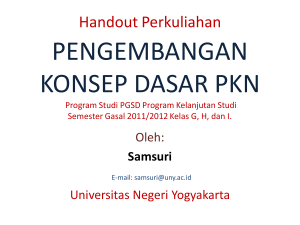The st udy of
advertisement
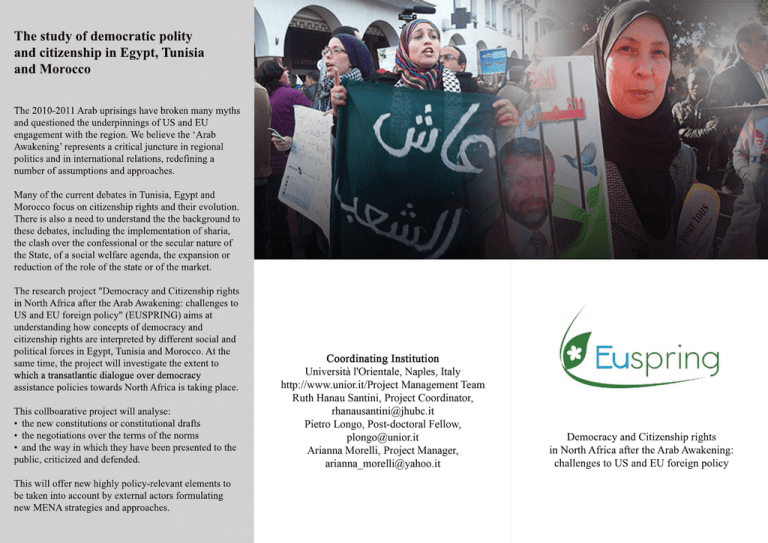
Thes t udyo fde mo c r a t i cpo l i t y a ndc i t i z e ns hi pi nEg y pt , Tuni s i a a ndMo r o c c o Th e2 0 1 0 2 0 1 1Ar a bu p r i s i n g sh a v eb r o k e nma n ymy t h s a n dq u e s t i o n e dt h eu n d e r p i n n i n g so fUSa n dEU e n g a g e me n twi t ht h er e g i o n . Web e l i e v et h e‘ Ar a b Awa k e n i n g ’r e p r e s e n t sac r i t i c a lj u n c t u r ei nr e g i o n a l p o l i t i c sa n di ni n t e r n a t i o n a lr e l a t i o n s , r e d e f i n i n ga n u mb e ro fa s s u mp t i o n sa n da p p r o a c h e s . Ma n yo ft h ec u r r e n td e b a t e si nTu n i s i a , Eg y p ta n d Mo r o c c of o c u so nc i t i z e n s h i pr i g h t sa n dt h e i re v o l u t i o n . Th e r ei sa l s oan e e dt ou n d e r s t a n dt h et h eb a c k g r o u n dt o t h e s ed e b a t e s , i n c l u d i n gt h ei mp l e me n t a t i o no fs h a r i a , t h ec l a s ho v e rt h ec o n f e s s i o n a lo rt h es e c u l a rn a t u r eo f t h eSt a t e , o fas o c i a lwe l f a r ea g e n d a , t h ee x p a n s i o no r r e d u c t i o no ft h er o l eo ft h es t a t eo ro ft h ema r k e t . Th er e s e a r c hp r o j e c t" De mo c r a c ya n dCi t i z e n s h i pr i g h t s i nNo r t hAf r i c aa f t e rt h eAr a bAwa k e n i n g :c h a l l e n g e st o USa n dEUf o r e i g np o l i c y "( EUSPRI NG)a i msa t u n d e r s t a n d i n gh o wc o n c e p t so fd e mo c r a c ya n d c i t i z e n s h i pr i g h t sa r ei n t e r p r e t e db yd i f f e r e n ts o c i a la n d p o l i t i c a lf o r c e si nEg y p t , Tu n i s i aa n dMo r o c c o . Att h e s a met i me , t h ep r o j e c twi l li n v e s t i g a t et h ee x t e n tt o wh i c hat r a n s a t l a n t i cd i a l o g u eo v e rd e mo c r a c y a s s i s t a n c ep o l i c i e st o wa r d sNo r t hAf r i c ai st a k i n gp l a c e . Th i sc o l l b o a r a t i v ep r o j e c twi l la n a l y s e : •t h en e wc o n s t i t u t i o n so rc o n s t i t u t i o n a ld r a f t s •t h en e g o t i a t i o n so v e rt h et e r mso ft h en o r ms •a n dt h ewa yi nwh i c ht h e yh a v eb e e np r e s e n t e dt ot h e p u b l i c , c r i t i c i z e da n dd e f e n d e d . Th i swi l lo f f e rn e wh i g h l yp o l i c y r e l e v a n te l e me n t st o b et a k e ni n t oa c c o u n tb ye x t e r n a la c t o r sf o r mu l a t i n g n e wMENAs t r a t e g i e sa n da p p r o a c h e s . De moc r a c ya ndCi t i z e ns hi pr i ght s i nNor t hAf r i c aa f t e rt heAr a bAwa ke ni ng: c ha l l e nge st oUSa ndEUf or e i gnpol i c y The first series of policy briefs Partners The Compagnia di San Paolo University L’Orientale in Naples This series of policy briefs provides a regular update of debates concerning key rights issues in three Arab states, Morocco, Egypt and Tunisia. In a first round of briefs on the three countries, we provide background on these debates since the beginning of the Arab spring. Arab Citizenship Review No. 1 - Egypt By Moataz El Fegiery and Ragab Saad, Cairo Institute for Human Rights Studies The University of Warwick European Policy Centre Arab Citizenship Review No. 2 - Morocco By Ward Vloeberghs and Youssef Benkirane, CERAM / Ecole de Gouvernance et d’Economie de Rabat, Morocco German Marshall Fund Cairo Institute for Human Rights Studies Arab Citizenship Review No. 3 - Tunisia By Ahmed Driss, Centre for Mediterranean and International Studies The Centre for Research on Africa and the Mediterranean Centre for Mediterranean and International Studies The first objective of the project is to understand the ways in which the concept of democratic polity, and one of its structural components, citizenship, is understood by different social and political forces in Egypt, Tunisia and Morocco. Against the background of a comparison between Western and Arab interpretations of rights, the project examines which social and political forces advocate the expansion or limitations of some specific rights. Analyzing discourses and debates surrounding rights provides unique lenses for an innovative and informative analysis of these transitions. The second objective of the project is to analyze to what extent international actors are redefining their democracy assistance policies as a consequence of the epochal changes and the actual shapes North African polities are evolving into. Through discourse analysis and in-depth interviews, we look in particular at the ‘world views’ behind democracy assistance by US and EU policymakers. Understanding the changes that the experience of the Arab Awakening may have triggered in Western policies towards MENA will also contribute to reformulating actor-based conceptions of their international role. The ways in which the US and the EU will redefine their goals and engagement paradigms will have an impact on the model they claim to pursue and on the theoretical understandings of their role.
